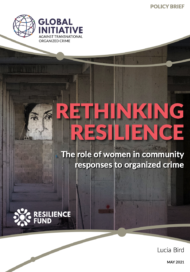Posted on 25 Mar 2020
‘No stone should be left unturned in apprehending those
responsible for the terrible deaths of 64 Ethiopian migrants in Mozambique,’
says Vusi Pikoli, senior advisor and board member of the
Global Initiative Against Transnational Organized Crime (GI-TOC).
Yesterday (24 March, 2020), Mozambican immigration
inspectors working on the country’s border with Malawi found
the dead bodies of 64 Ethiopian migrants in a lorry container, alongside 14
survivors.
This ghastly tragedy is a grim reminder of the daily risks
faced by significant and growing numbers of migrants using the services of
human smugglers both in Africa and beyond, as the
number of recent similar tragedies across Europe demonstrates.
‘It is sickening that human life can be so expendable in
exchange for illicit profits,’ says Pikoli. ‘There is a political, legal and
moral obligation on governments and law-enforcement agencies to act decisively
on all human-smuggling cases. The families and loved ones of the deceased men
must be traced. No stone should be left unturned in the investigation and
prosecution of the criminal network responsible for this tragedy.’
‘This horrendous incident also speaks to the enormous
double standards at play when tragedies like this occur in Africa,’ says GI-TOC
Director for East and Southern Africa, Julian Rademeyer. ‘Similar
incidents in Europe have sparked international headlines and outrage. When
these tragedies occur in Africa, they go largely ignored and unreported. It is
an absolute travesty. To prevent needless deaths like this, coordinated
national, regional and international responses are called for to aid the
vulnerable, and we need to explore policies to create safe pathways for labour
migration.’
It is most likely that this incident constituted human
smuggling, where networks facilitate the irregular cross-border movement of
consenting migrants, rather than trafficking, where networks deceive and coerce
victims. And, although shocking, it is not a one-off – the GI-TOC’s Organized Crime Index
Africa 2019 has found that both human smuggling and trafficking are
prevalent in almost every country in Africa.
The legal framework governing human smuggling in Mozambique
appears to be weak, with the authorities reportedly issuing a prescribed US$30
(2 000 metical) fine for offences related to the facilitation of irregular
migration; this is less than 10% of the 30 000 metical fee offered to the
driver to transport the migrants. The risk/reward ratio is clear.
The migrants, all of whom were men, are believed to have
suffocated while being smuggled across the increasingly popular southern route
towards South Africa. Although press attention typically focuses on those
moving towards Europe, the vast majority of African migrants move between and
within countries on the continent. The international travel restrictions
flowing from the COVID-19 pandemic may further swell this intra-continental
movement.
The flows into Mozambique have been on the rise,
attributable both to growing numbers moving along the southern route and to
increased labour immigration drawn
to the country’s burgeoning extractives industry. Ethiopians make up a
significant number of those moving southwards, particularly since increasing
instability in Libya has disrupted the northern route towards Europe.
Three years ago, the GI-TOC highlighted the growing use of
refrigerated containers in global human-smuggling operations as cause for
concern. Similarly, the GI-TOC stressed that the November 2019 death of 39
Vietnamese migrants in a truck in the United Kingdom was not
an isolated incident, and urged policymakers to take action to stop
migrants continuing to die in trucks.
In stark contrast to the global media responses to such
tragedies when they occur in Europe, international press coverage of
yesterday’s incident in Mozambique has been more muted. Although in part
attributable to the COVID-19 pandemic, which has dominated coverage, this also
reflects global apathy towards such incidents when they occur in Africa.
This fatigue regarding African tragedy can also be tracked
in responses to migrant fatalities resulting from mid-journey container
abandonments by smugglers operating the northern route, particularly across the
Sahel and North Africa. This needs to change.
For further information, please contact Claudio
Landi: claudio.landi@globalinitiative.net
Photo: Survivors
from the container rest on the ground after they were found alive inside a
truck with 64 dead, Tete province, Mozambique. (EPA-EFE)



